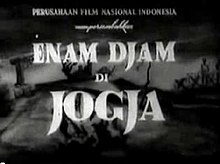Enam Djam di Jogja
| Enam Djam di Jogja | |
|---|---|

Title card
|
|
| Directed by | Usmar Ismail |
| Produced by | Usmar Ismail |
| Written by | Usmar Ismail |
| Starring |
|
| Music by | G. R. W. Sinsu |
| Cinematography | Max Tera |
| Edited by |
|
|
Production
company |
|
|
Release date
|
|
|
Running time
|
116 minutes |
| Country | Indonesia |
| Language | Indonesian |
Enam Djam di Jogja (Perfected Spelling: Enam Jam di Yogya, literally Six Hours in Yogya) is a 1951 Indonesian film directed by Usmar Ismail. It was the second film to be produced under the PERFINI banner. Detailing the show of force in which the Indonesian republican army retook the capital at Yogyakarta for six hours, the film utilised much of the cast and crew from Ismail's previous work Darah dan Doa (1950). The film was a success in Indonesia and continued to be screened on the state television channel into the 1980s, even after two further films about the event were released.
Amidst the Indonesian National Revolution, the Dutch colonial army has launched an assault on the Indonesian capital at Yogyakarta. After being overrun, the Indonesian Army withdraws, to continue the fight as guerrillas. In the city proper, the Indonesian populace suffers extensively.
In early 1949, the Sultan of Yogyakarta, Hamengkubuwono IX, orders a show of force: the guerrilla soldiers are to take back the city, hold it for six hours, and then withdraw. This attack, intended to show that the Dutch had not put down the Indonesian forces and thus embarrass the returning colonists in front of the United Nations, goes as planned on the morning of 1 March. The Netherlands recognises Indonesia's independence by the end of the year.
Enam Djam di Jogja was directed and produced by Usmar Ismail. It was his second film dealing with the national revolution following Darah dan Doa (The Long March) the preceding year, which had followed the Siliwangi Division's long march to West Java. The black-and-white film Ismail also wrote the film's story, with Gajus Siagian handling the screenplay. In the film's opening credits, he wrote that it was intended to show the "tight cooperation between the people, army, and government" without which the 1 March General Assault could not have happened and commemorate those who had fallen fighting for the nationalist cause.
...
Wikipedia
